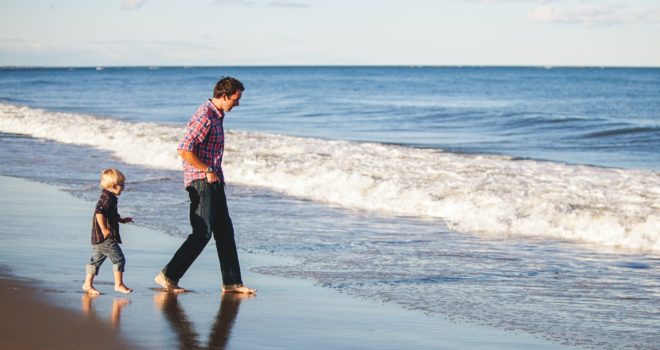Recently, we had the opportunity to go on a trip to the beach with my husband’s side of the family. It was a beautiful trip, but one of my favorite parts was watching my husband with our daughters.
Our daughters range in age from 4 years old to almost 11. When the girls ventured into the waves with me, I was really cautious with them. If we were deeper than our waists, and if the waves were choppier than usual, I made sure to either hold their hands or keep them within arms’ reach.
With their father, they were far more adventurous. The two oldest would go out into much deeper water at his side, and he taught them how to jump with the waves. With the youngest, he led her into shallower water, but he taught her to do the same—to clutch his strong hands with her chubby ones, hopping over the crashing waves.
One of these mornings at the beach, I had set up an easel and was working on painting the scenery, when I spotted the two of them out of the corner of my eye. The waves crashed bigger than usual, and much closer than usual. My husband crouched down in the waves, so that he could be at the same level as our youngest daughter. He held her hands as she did her little hops, but occasionally a particularly large wave would come. When one of these crashed over them, he would scoop her up and lift her up and over the wave, setting her gently back down after it passed. Her little legs would dangle into the water, but the rest of her was safely above the surf, her happy face laughing down at the gaze of her father.
As I watched them, I thought of God the Father, and of the importance of a loving parent in helping children grow up in a way that they able to trust him.
The Little School of Love
My husband and I are not perfect parents, but we genuinely love our children. From those first disbelieving moments holding a positive pregnancy test, to the day when their little cries first pierce the room, to first days of school, and all the little and big sufferings and challenges they encounter—we have loved them. Our children (even the one we lost to miscarriage) have always been loved by us.
When they make mistakes, they are received with mercy and gentleness (most of the time!). If they are sad, they know that they will be held. When they are scared, they know we will reassure them. When they are confused, we answer their questions. At times, they are worried; we listen and soothe. And when we have the option to suffer so that they can be spared, we do.
There is nothing remarkable about this. Any healthy parent would do the same. Yet, as ordinary as these actions of parenting may seem, they carry an eternal weight—we are children’s first introduction to the love of God.
If we are merciful, they will view God as merciful. If we are gentle, they will approach God with a longing for his gentle gaze. When we love them unconditionally, then they will easily imagine the unconditional love of their heavenly Father.
Being God’s Child in Suffering
Most people have no objection to a God who loves in a gentle, loving way—it is a God who allows us to suffer that is more difficult to understand.
But a good parent isn’t just one who makes his or her children feel good. A good parent is one who helps them face the hard things in life, too. A good parent helps their child navigate suffering, disappointment, and pain, especially if the parent knows that such suffering is necessary for the child’s healing.
Right before the pandemic, I had a child in the hospital (for non-covid reasons). When she was admitted, she was really dehydrated, and she needed an IV. I hope that you have never needed an IV or had a child need one, because those needles are huge. My poor child sobbed and begged us to not make her get an IV. But the thing was, she was sick, and she needed one to get better. I couldn’t remove that suffering from her life because I knew that this suffering would ultimately lead to her healing. All I could do was hold her, soothe her, and love her through that suffering. I knew that it was necessary.
A loving parent knows what suffering is necessary, and what is not. Sometimes, that means holding your child’s hand or teaching her to jump over the waves. Sometimes, it means lifting her over the crest of a wave, sparing her the roughest part. And sometimes, it means just holding her in the midst of the rocky surf.
And so it is with us and God.
A child who has been loved by his or her parents in this way will have an easier time grasping the theology of suffering, and how it is possible for suffering to co-exist with a good and loving God.
More so than any book you read to them, your actions as a parent can make the love of God, the theology of suffering, the nature of vocation, and God’s plan makes sense to your children. God is a loving Father—one who knows what waves we can withstand, what suffering is necessary to undergo for our healing, and when we need to be lifted above the waves and bask in his gentle gaze.
✠
Photo by Danielle MacInnes on Unsplash













